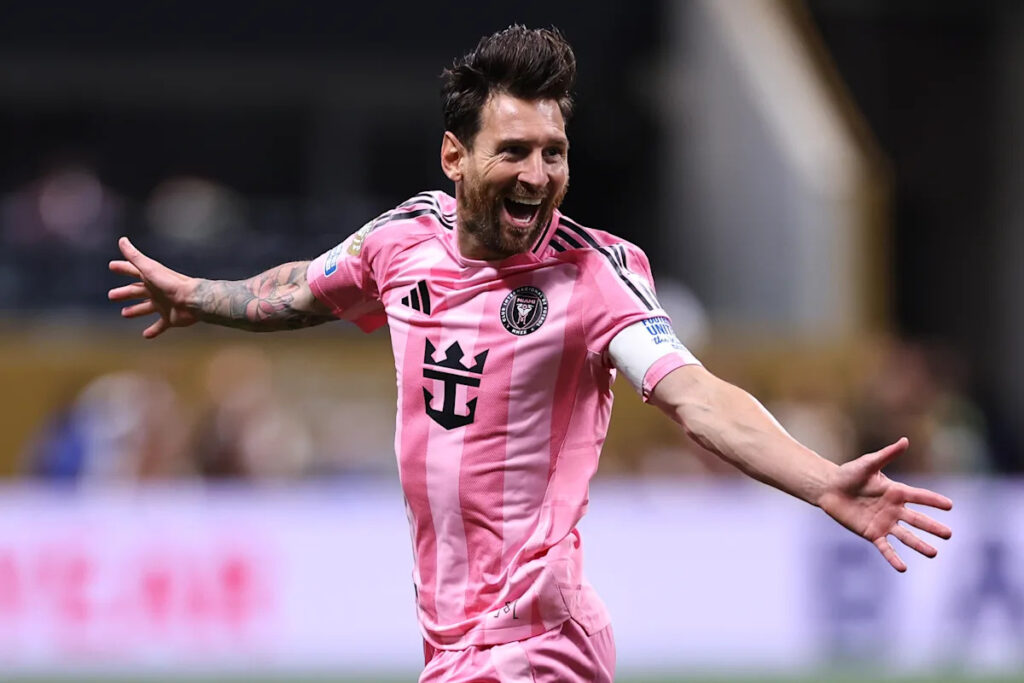ATLANTA — For more than 20 years, one rule has governed international soccer: the more Messi, the better. Whether you’re fighting for eyeballs, relevance or legitimacy, having Leo Messi’s godlike stature — and 500 million Instagram followers — in your corner solves a whole lot of problems.
So it wasn’t a real surprise to anyone paying attention that FIFA turned to Messi as a way of kickstarting interest in the 2025 Club World Cup. Last October, FIFA announced that Messi’s Inter Miami club would host the Club World Cup’s inaugural match, despite not qualifying under any established criteria. FIFA’s reasoning was obvious, cynical and — judging by the 60,000-plus in attendance at Saturday’s CWC debut — highly profitable.
Advertisement
The real test of Messi’s drawing power came five days later, on a rainy Thursday afternoon in Atlanta. Inter Miami faced a favored FC Porto in the second match of their group stage, jumped out to a 2-1 lead, and hung on through a furious finish, plus seven long minutes of stoppage time, to leave Atlanta with an impressive, crucial 2-1 victory.
Porto struck first, thanks to a penalty against Miami’s Noah Allen that gave Samu Aghehowa a penalty kick he drove home. That 1-0 lead held up through the first half, with FC Porto keeping the older Miami squad in check. But just two minutes into the second half, Inter Miami’s Telasco Segovia scored the equalizer on a brilliant cross from Marcelo Weigandt:
And then came one of those Messi moments that make soccer so compelling and Messi himself so magnetic. In the 58th minute, Messi fired a free kick that seemed piloted by a drone, well outside the reach of Porto goalkeeper Claudio Ramos:
Those are the moments why Messi’s armada watches, the moments soccer fans admire, the moments FIFA craves. Messi’s kick might be the moment so far of the still-young tournament — admittedly, a low bar to clear — and if this tournament can harness more of the jolt that Messi’s goal sent through the crowd, the Club World Cup will be on a much more solid foundation.
Advertisement
Thursday’s attendance still didn’t approach anything near sellout levels, though the Mercedes-Benz Stadium seats were markedly more full than Monday’s echoing, sparse Chelsea-LAFC match. Some of the same rationales applied for this match: high ticket prices plus a 3 p.m. weekday kickoff aren’t exactly conducive to a full stadium experience.
On the other hand, if Lionel freaking Messi can’t draw fans to the Club World Cup, who can? Messi has filled Mercedes-Benz before; his Inter Miami debut was a sellout despite the fact that he didn’t play, and Messi and Argentina lit up Atlanta at last year’s Copa América tournament. FIFA announced attendance at Thursday’s match of 31,783 — almost 10,000 more than Monday — and about half seemed to be wearing Messi’s Inter Miami or Argentina jerseys. Chants of “MES-SI!” thundered through the stadium throughout the second half.
That’s the key to Messi’s power: regardless of the results of any one match, he’s transcended both the game and national loyalties the way few others have. You don’t have to know a single other player on Messi’s Inter Miami squad to root for them; their association with Messi is enough.
Off the pitch, Messi remains a PR force of nature. In the two years since he joined Inter Miami for a twilight-of-his-career payday, he’s become a marketing behemoth in the United States, appearing in Super Bowl ads and crossing over with Patrick Mahomes and others in a bid to introduce American soccer skeptics to what the rest of the world has known for two decades.
Advertisement
As Boardroom noted earlier this week, Messi rocketed Inter Miami’s valuation and popularity into orbit; the club is now worth $1.2 billion, nearly double what it was before Messi signed in 2023. Inter Miami now ranks second behind only LAFC in valuation among MLS clubs, and its 17.3 million Instagram followers dwarf every other MLS squad. (LA Galaxy ranks second at 1.5 million.)
The vexing question now facing FIFA is just how long the Club World Cup will be able to leverage all that popularity. Messi and Inter Miami will enjoy a return to Miami for the conclusion of the group stage, though they’ll face a significant challenge from Palmeiras. If Inter Miami manage to advance, they face either another date in Atlanta or a trip to Philadelphia, depending on their group standing.
The Messi Effect remains a powerful force in American soccer, but the Messi Effect can’t solve all problems. Messi is the closest thing soccer has to a cheat code, but there are no shortcuts to establishing a soccer foundation in the United States. If the Club World Cup is going to take flight this year, and if the World Cup is to connect on a national scale in 2026, FIFA is going to need help from a whole lot more than just Messi. Even at age 37, he still can do virtually anything, but he can’t do everything.
Read the full article here


